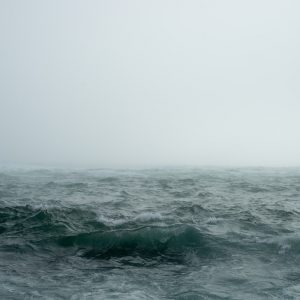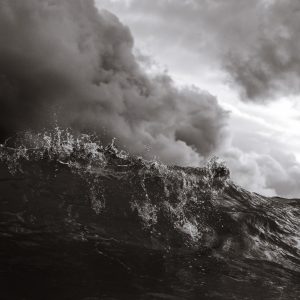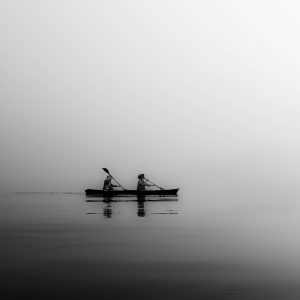When Crenshaw shoots Anneke, he’s within arm’s reach of me. I watch my hand grab him by the back of the neck. My body follows through, and I keep moving. He loses his balance. I feel the base of his skull stretching the web between my thumb and pointer for a second of resistance, and then his head drops out of my han,d and I drop too and sit straddling his body, my crotch seam slicing into my balls, and he can’t breathe in. I should get off him. But I don’t. There’s no way Anneke’s alive. Crenshaw wants to lift himself off the ground, but his arms are trapped, and I weigh two hundred and seventy-five pounds.
I can see the gun where it fell and Anneke where she fell, I can see the curtains blowing in the open windows of the cabins and the wind agitating the lake, but none of it matters. What’s important is that no one’s talking. Little waves slap each other near the shore.
After a while, my knees start to hurt. I’m not ready to get up, though. I think about all the things, now including violence, that Crenshaw has polluted our resort with. When Crenshaw and I bought this place, he used to sit still, sometimes, long enough to hatch a new marketing idea. Every plane he got on, he’d convince another few people to come and stay, and we had guests booking in for winter before we were ready for it. I made slow-cooked food, and they forgave the space heaters. Now people drive through storms to eat the thick soups I ladle out. It was all perfect, until Crenshaw came back from another long trip wearing a Rolex and talking about spending the winter in the tropics. Crenshaw wasn’t happy unless his lips were blistered from the sun, and that wasn’t happening during the Vermont winters, no matter how much he skied.
Crenshaw was really cute when I met him. Dirty blond, legs a little bowed, and shorter than me, maybe five-eight. He reminded me of a sandy mutt we had when I was growing up: impish, and desperate for love, and not always sure which impulse to go with. We were working as an Appalachian Trail crew, sleeping in hammocks, making up stupid songs. When we finally got to Killington, Vermont, late in August, we hiked to the top of the highest slope and climbed onto the lift platform. Looking out across the valley, we dangled our legs over the edge and talked about what was next. I wouldn’t get my trust money if I didn’t finish my law degree, but then I was going to cooking school, so I knew that.
“I’m going to own a big piece of this,” Crenshaw said, as the sun turned him orange.
“Of Killington?”
“Of somewhere.”
That was the day we agreed to start putting away a fixed amount per month, the idea being that it would be easier to own a big piece of Vermont if we approached the challenge together. Even though I’d never considered property before, I knew that if I owned something, no one could stop me from cooking there.
I never knew how to reach Crenshaw, but he sent me postcards. There was one from a resort in Colorado when I was halfway through the Cordon Bleu. “Resorts are where it’s at,” he scrawled. “People pay too much. It’s the rule. They’re miserable if they don’t.” He wrote from the Caribbean, where he was sailing horny divorcees between islands: “The best resorts put their staff in polo shirts with the logo stitched on.” There was a stain in the corner of the card, and he’d written “tuna fish” with a little arrow pointing to it. That was Crenshaw. He needed me to know everything. I didn’t mind that, in postcards.
When we bought this land, I was so amazed and happy that Crenshaw had saved the money, that we’d actually paid fifty-fifty for the land, that I agreed to his color scheme and to the layout of the cabins he drew for me on the paper of a dry-cleaning hanger. We built six cabins for starters, and Crenshaw hired a cleaning lady who wore a polo shirt, and eventually a boat boy who wore one too. The shirts were royal blue with the name of the resort in yellow. Lakeside, all capitals, with the L and the final E just a bit bigger and the central E and S just a bit smaller than the rest, making the word imply the curve of a shore.
He was made for the marketing work, and people loved Lakeside. Just before they arrived, he’d rub his hands together faster and faster, like he could hear guests turn off the road onto the long driveway, even though we didn’t have gravel yet. We still don’t. We prioritized expensive brass lanterns for the porches, then a new set of beautiful wool blankets for all the beds, and then it was time to repaint.
The first time Crenshaw went to Bali, he stayed nearly a month, coming back before Christmas with a suitcase full of sarongs and painted wooden masks.
“Who are those for?” I asked him.
“Us,” he said, like a little kid who’d brought home a construction-paper project. I didn’t like the colors, though. They were Florida colors.
“We can use them as tablecloths on the little tables on the porches,” he said.
“And the masks?”
He looked around, hands on his hips. They clashed with the wide stone fireplace and the lanterns and the Ansel Adams photographs. “I don’t know,” he said, shrugging. “They’ll brighten up some corner or other.”
“Put them all in your room for now,” I said.
“You should see the furniture they make there,” he said. “It’s so sensual it’s crazy.”
The next time he went to Bali, it was the end of April. A few days later, a freight-forwarding truck rumbled down the driveway, and I found myself signing for a huge, heavy box. The driver asked me where to put it. I asked him what it was. “It says here ‘coffee table’,” he said. I said, “Oh,” and thought, Shit, and I asked him and his buddy to carry it into Crenshaw’s room, but the box wouldn’t fit through the door, so I had them leave it in front of the fireplace. I looked at the date on the waybill and realized I was about to open something Crenshaw had shipped from Bali in November. I took a steak knife to the box.
The thing inside, which I unwrapped from yards of organic-looking paper and packing tape, was a naked, long-haired, wooden woman. Stained more orange than brown, she was on her back with her hands raised and her knees and feet up, requiring a piece of glass to be cut as a table top. Her head didn’t rest on the floor, so it didn’t look as if she had lain down because she wanted to be of service as a table. Her neck was taut, and her face, neither fully Asian nor Caucasian, was difficult to read. She looked confused, as if she’d thought she was alone. I had to admit it was cunning how the carver had found wood he could fashion so the grain delineated the shape of her breasts. I looked between her legs to see if the grain split at her crotch, but he hadn’t gone into genital detail. From the top, she looked naked; from her back end, she looked like she had panties on. From any position, she looked like she wished she were back in the box. I returned the knife to the kitchen and came back with trussing string. I did the best I could to wrap her up again, and then I pushed her between the overstuffed chairs and through Crenshaw’s bedroom door, closing it behind me.
Crenshaw’s return always made me a little uncomfortable, but this time was worse. I had a fantasy of running Lakeside on my own for good, keeping it simple, keeping its design consistent. Keeping it, I don’t know… chaste.
He came back at the beginning of July, with a quartet of Russians: two large men with small eyes, one slim one with gray teeth, and a long-haired woman they seldom talked to. He’d called from Bali to ask me to book the group into two cabins, which was a shame because I had to turn down a minor Auchincloss the next day as a result.
“Your coffee table arrived,” I said when he came back to the main cabin after showing the Russians to theirs.
“My what?”
“Your sensual furniture.” It took him a second, but then he was with me. “It’s in your room.”
I went to the kitchen to start on lunch. Crenshaw came in with fevered eyes.
“Did you see her?” he said.
“I unwrapped her.”
“You see what I mean?”
“Kind of.”
“Go look at her again,” he said, then one of the Russians walked past the window, and Crenshaw practically skipped out to bring him inside. They went to Crenshaw’s room, and there was talking and laughter and silence and more laughter. I had trouble concentrating on the potatoes. Crenshaw popped his head back around the doorframe and asked if there would be enough lobster at dinner for everyone to have two.
What I liked about the Russians was that Crenshaw left me in peace to cook the huge amounts of food they required. What I didn’t like about the Russians was the way their way-too-yellow Rolexes stood out against their sunburns. I could tell it made our other guests uncomfortable, too. Everyone who stays with us has money, but no one wears anything that hurts their eyes when the sun hits it. The Russians loved their sunburns and treated their skin like a lint roller, peeling it off to reveal a perfect, fresh layer. The two single men loved the coffee table so much that they moved it into their cabin, and Crenshaw called around to get a glass top made.
At the end of their stay, they overlapped for a few days with two Dutch women, Anneke and Marit, my favorite guests ever at Lakeside. Crenshaw had also found them in Bali. Anneke walked around slowly on her sinewy legs, checking out the plants on the edges of the paths. Stockier Marit, with her short-short hair, her twinkling eye, insisted on cycling and swimming between cigarettes.
I had planned smoked salmon with fresh wasabi mayonnaise for lunch on one of those days. The bread was in the oven. I’d picked one wasabi root (I grow my own) and washed and trimmed it, and I was getting ready to grate it when Marit and Anneke came to the kitchen door, smiling, inhaling.
“Brood!” said Anneke.
“Ja!” said Marit.
“And what is that?” Anneke asked, pointing at what I was grating.
“This is wasabi.”
“Oh!” they both said, and walked over to the kitchen island.
“Are we in heaven?” asked Marit.
The sound of footsteps brought Oksana into view. She was freshly showered, and the tips of her wet hair darkened her red t-shirt. I smiled and stepped away to put the wasabi in the fridge and get out some eggs, and when I turned back around the three women were smiling at each other. I love women. These three were very good at kitchen choreography, not a problem at all to work around as I made mayonnaise, sliced the smoked salmon, and took the bread out to cool. I learned that Anneke and Marit were crossword-setters. Oksana had been managing a jewelry store but had quit to take this trip.
I asked Oksana what she thought of the coffee table.
After a moment, she said, “I try not to think about it.” She explained what it was to the Dutch women, and then said, “Come, I’ll show you.”
Crenshaw came out of his bedroom and found me in the kitchen. That morning, he’d finally decided to catch up on his sleep, having exhausted himself trying to keep up with the Russians. When he’s tired, his eyes get really small. His hair was flat on one side, tousled on the other, and he was holding two Balinese masks. “Do you think we could make these into tea-light holders?”
“No.”
“The light could come through their eye holes.”
I put down my whisk and turned him around by the shoulders, then walked him out of the cabin, across the driveway, and in between the two nearest cabins to look out over the lake. “You see those mountains there?” I asked him.
“Yeah.”
“What are they called?”
“The Adirondacks.”
“Right. And the chairs on the porches here? What type of chairs are they?”
“Adirondack chairs.”
“Right.”
“This is where we are, Crenshaw. I don’t know where you are in your head now, but this is where we are. People don’t come here for mystery and masks. They come for simple things. They come for the fresh air. You’re starting to mix up the message, man.”
A car came down the driveway. It was the Maitlands, back from a morning antiquing.
“Anything good today?” I called when they got out.
“Lovely pair of Windsor chairs!” Mr. Maitland called back.
“Excellent work!”
I turned back to Crenshaw. “You see? You see? You turn Lakeside into a Hindu hideaway, we’ll lose the Maitlands.”
“Vlad says he can guarantee us a full house of Russians every summer, every winter, no problem.”
“What the fuck, Crenshaw?”
Then the three women came laughing out of the Russians’ cabin, saw us, and walked over. “It’s awful,” Anneke said.
“I could see some merits,” said Marit.
“We made some adjustments,” said Anneke. “Come.”
I didn’t tell Crenshaw what we were talking about and encouraged him to come too.
The Russians’ cabin smelled of wood stain and wet towels. I looked in front of the sofa for the wooden woman. “There,” said Oksana, pointing. They had propped her up so that she was seated with her back against the wall. Over her outstretched arms, they had arranged a copy of the New York Times. She looked like she was craning to finish reading something.
“Hey!” said Crenshaw, tearing the newspaper off her arms and throwing it aside. “She’s supposed to be on her back. Help me move her to where she was.” He leaned down and took her left arm and leg, waiting for someone to join him on the other side.
“No,” Anneke said evenly, but Marit and Oksana were already moving forward to help carry the woman, who suddenly looked helpless again. Oksana looked chastened. Marit let her do the honors, and we watched her help Crenshaw put the coffee table back together.
“Now leave her alone,” Crenshaw said and exited, letting the screen door slam.
“Sorry about that,” I said to the women.
“No, no,” Marit said. “It’s us.”
We walked back outside, and Oksana said, “Oh.” We followed her line of sight to the top of the driveway, where two of the Russians were walking their bikes, and one was carrying his. When they got a bit closer, we could see that the front wheel was curved like a potato chip. I went inside to find Crenshaw so that he’d be the one to greet them. He was in his room.
“That sucked, you know,” he said.
“Yeah, well, so does the fact that one of your friends just Pringled one of our new bikes.”
His face twitched. We hurried back out, where he looked over towards the women and then past them to the men. “They didn’t do it on purpose,” he said.
“You’re right,” I conceded. “But it still needs to be handled. Go see what you can do.”
I went back inside and watched through the picture window. Anneke and Marit seemed to want to stay with Oksana as the three men approached, but when Crenshaw walked over, they made their excuses and headed to their cabin. Once the men were within earshot, they started shouting, smiling, and shrugging, gesticulating with their free hands. Crenshaw laughed and shrugged, too, but Oksana kept her arms crossed. The one with the broken bike put it down and they all stood around and looked at it, and then the biggest Russian laid the bike down on the driveway, steadied himself with a hand on each friend, and stood on the bent wheel, bouncing up and down, harder and harder, trying to flatten it out again.
I got there just as two spokes popped out of the rim. “Whoa,” I said. “Whoa! Not a good idea, guys.” I looked hard at Crenshaw. “Not a good idea at all.” I felt like such a party pooper, but seriously, you’ve got to think about the hub. The Russians stood back. I’d broken some sort of spell. “I’ll take it,” I said. I thought they might offer a bit of money, but they didn’t.
The next morning, after breakfast, I stood in the driveway with Anneke and Marit, waving goodbye to the Russians. Crenshaw drove them to the airport because they’d had to buy two more suitcases for the things they’d bought and couldn’t fit them in their rental car. I sighed with happiness as we stood and listened to their engines fade into the trees. Marit had tipped her face to the sun and closed her eyes. Anneke was looking at me. We didn’t say anything, just smiled in the quiet.
Crenshaw took a while to recover after the Russians left, but his eyes returned to normal size in a few days, and once he was focusing properly again, he watched the Dutch women with interest. I took this as a good thing. They went along on one of the sailing trips. I was so happy that day, knowing that Crenshaw was out with a better group of friends. But it was that night that I found him standing outside their bedroom window.
I had headed down toward the lake for my usual pre-bed stroll. I doubt if I would have seen Crenshaw if his Rolex hadn’t caught the pale moonlight. I felt the electricity coming off him the moment I realized who he was. When I stopped walking, the sound of my footsteps no longer masked the sound of the Dutch women’s lovemaking.
I couldn’t call his name because the women would hear me, and if I went up to him and pulled him away, they’d hear that too, so I just started walking again, hoping Crenshaw would hear me and would clear out before I came back up.
I kicked at the pebbles under my feet and picked up a few, even though it makes my dinner come up into my throat when I bend over that far. I threw them out into the darkness of the lake and heard them plop, and wondered what the hell I was going to do about Crenshaw’s eternal adolescence.
He was gone when I came back up, and in the main cabin, the door to his room was closed.
After I’d cleaned up the next night, I sat in the living room and waited. Crenshaw was in his room. When the Dutch woman’s cabin lights went off, I got up and was outside his door when he pulled it open.
“Hi,” he said. “I thought you were in bed.”
“You’re not going out there.”
“Out where?”
“You’re not going to stand outside their window tonight.”
“I don’t know what you’re talking about, man.”
“I saw you.”
He looked down at the floor.
“I saw you, man.”
When he looked up, his eyes sparked. “Come with me.”
His energy was like a drug, and for a moment, I was in danger of getting high on his fumes, but it wasn’t right.
“Go to someone else’s hotel to listen to the guests in bed, Crenshaw. Don’t do it in mine.”
“Yours? Yours, asshole? I’ve got fifty percent of this and I can walk where I like and I can stand where I like and I’d like to see you try and stop me.”
I tried to scare him with a look, but he brushed by me.
“And if they find out?” I called after him.
Marit got the email message about her father the next morning. She was on the computer most of the da,y making arrangements, Anneke’s hand on her shoulder. The next day, two days ago, she flew back on her own because there was only one seat on the Delta flight from Boston to Amsterdam, and Anneke opted to stay at Lakeside rather than take a hotel room in Boston and wait for the next available seat. Anneke drove Marit to Boston, and then came back and stood in the kitchen with her head hanging and her arms folded under her braless breasts. I was slicing potatoes on my mandoline, making a rhythmic swish.
“Did you like her father?” I eventually asked.
“I didn’t get the chance.”
“Oh. I thought you’d been together for a long time.”
“We have been. But he didn’t approve.”
“I thought the Netherlands was a civilized place.”
“Some of it,” she said. “Marit grew up outside the city, quite far.” After a few more seconds of only potato noises, she said, “One time, when Marit was visiting her parents, and her father was going out in the car, she leaned on the side of the car, with her hands on the window frame, you know? She was wearing a shirt with no sleeves, and her father saw her armpit hair, and he was so shocked, and he said, ‘But women don’t have armpit hair!’”
“Seriously?”
“Even his wife had never shown him. He’d never seen her shaving.”
I put the potatoes aside for later and made a shallot vinaigrette.
Crenshaw got up in time for lunch, so it was the three of us and two couples from New York who had come up to do some hiking while their kids were at summer camp. All the other guests were out for the day. I put the vinaigrette on lightly grilled zucchini, and did some chicken kebabs, and there was a shake in Crenshaw’s hand when he opened the Chardonnay and poured, but not a big one, and he was charming.
This morning, Anneke told me that Marit had called and said not to come back yet because the family dynamics were awful, and it helped her to know that Anneke was in a peaceful place. We were sitting on the porch of her cabin with coffee. I looked out at the lake and breathed it in. Seemed like a good time to leave her alone. I strolled to the main cabin and the smell hit me when I came through the screen door: part barn, part iron filings, part banana bread. Someone was thunking around in the kitchen. Crenshaw. There was a dirty rag next to an open bottle of whatever was smelling so manly. He’d been cleaning a pistol on the island. Now he was trying to get it back together. He wasn’t tall or strong enough for the job, and he kept bashing the butcher block with the magazine to get it to go all the way in. I knew he’d taken the Russians to a firing range, but it didn’t occur to me that he’d been shooting too, above all with a gun of his own. Once the magazine was finally in, he looked up at me with pride. He was shocked at the expression on my face.
“Get that shit out of my kitchen!” I yelled, and he said, “I was just—,” and I rushed over to get the rag off the butcher block. “I know what you were doing,” I said. “Why the hell were you doing it in here?” I got the top back on the bottle to stop it polluting the air, and he said, “The light was better,” which was the last straw, and I said, “Get out of here! Never bring that shit in here again!” and he left the kitchen. I thought he was going to his room, so I stepped over to the sink for a sponge, but I heard the screen door bump. I ran after him.
“Crenshaw!” I shouted from the steps, but he kept on walking, so I ran out into the sunshine and thumped him on the shoulder with a “Hey!” and he turned around. He was holding the gun and the rag and the bottle against his chest like a little kid who’s taking his toys home in a huff. He looked so sad. “Dude,” I said, trying to calm down, trying to start a useful conversation. “You can’t go walking around the resort with a gun.”
“Yes, I can,” he said.
I shook my head and made come here motions with my hands. “Let’s get back inside and put that stuff away, okay?”
“You know what?” he said, taking a step back.
“What?”
“Tell me the last time you had anything good to say about anything I did.”
“Dude, you know I don’t like guns. You can’t expect me to say something good right now.”
“Whatever, man! Just answer the question!”
“Okay, okay. Well, I thought the polo shirts were great. I told you that.”
“Sure. Four years ago. Got anything more recent?”
I looked around for an example, but all I could see were things I tried to protect from Crenshaw’s ideas. Then I started feeling the injustice of what he was pulling.
“It’s not like you say anything good about what I do here either,” I said.
“I don’t have to!” he said. “Everyone tells you how great your cooking is, how beautiful the place is. But there’d be no one here to tell you how great you are if I weren’t out there bringing them in. No one!”
“What?” I shouted back. “You’re telling me the beautiful view and the good food don’t mean anything?”
“Oh, I’m irrelevant now?”
“No, of course not! That’s not what I’m saying.”
“Yes, it is, asshole.”
Crenshaw had tears in his eyes, and it broke my heart, so I blurted out, “The boat! The boat was a great idea!”
“They think I’m the fucking boat boy, man!” he practically screamed.
I shouted back at him, “You know what? I wish you were the boat boy because then you wouldn’t think you could keep coming up with stupid-ass decorating ideas!”
Then Anneke came out of her cabin, worried. She said, “Is everything okay?” and Crenshaw turned around and put a bullet in her brain.
I was on him so fast I didn’t see the look on his face as he watched Anneke go over backwards. I didn’t want to see what he thought of what he’d done, and I didn’t want him to be thinking it for long. The pistol skidded a little distance, and the solvent bottle rolled away. Crenshaw struggled as much as he could, but he couldn’t much, and I couldn’t watch, so I looked out between the cabins at the lake, and I listened to the sounds of nature in the quiet.
Everything’s calmed down completely now. Birds have started twittering again, and I’m starting to think in terms of ramifications, not so much for me as for Marit. It’s time for me to get up, and it’s extremely difficult. I have to push against Crenshaw’s back to get my right foot out from under me and place it flat on the ground so that I’m just on one knee and can stand back up. It hurts a lot. I think about the feel of Crenshaw as I lean on him, the warmth coming through his shirt. I take this to mean that I haven’t been sitting on him for very long, no matter what my knees are saying. Crenshaw’s hair has fallen over his face, and he looks like he’s napping. He must have forgotten he’d loaded the gun. He must have. Maybe he just wanted to scare Anneke, to make her go away, but he pulled the trigger reflexively, by mistake. It’s good that he won’t wake up. It’s good. Now I hurry. I run to the main cabin and I call the police. I look out the window at the bodies. I prepare myself to miss Crenshaw.




